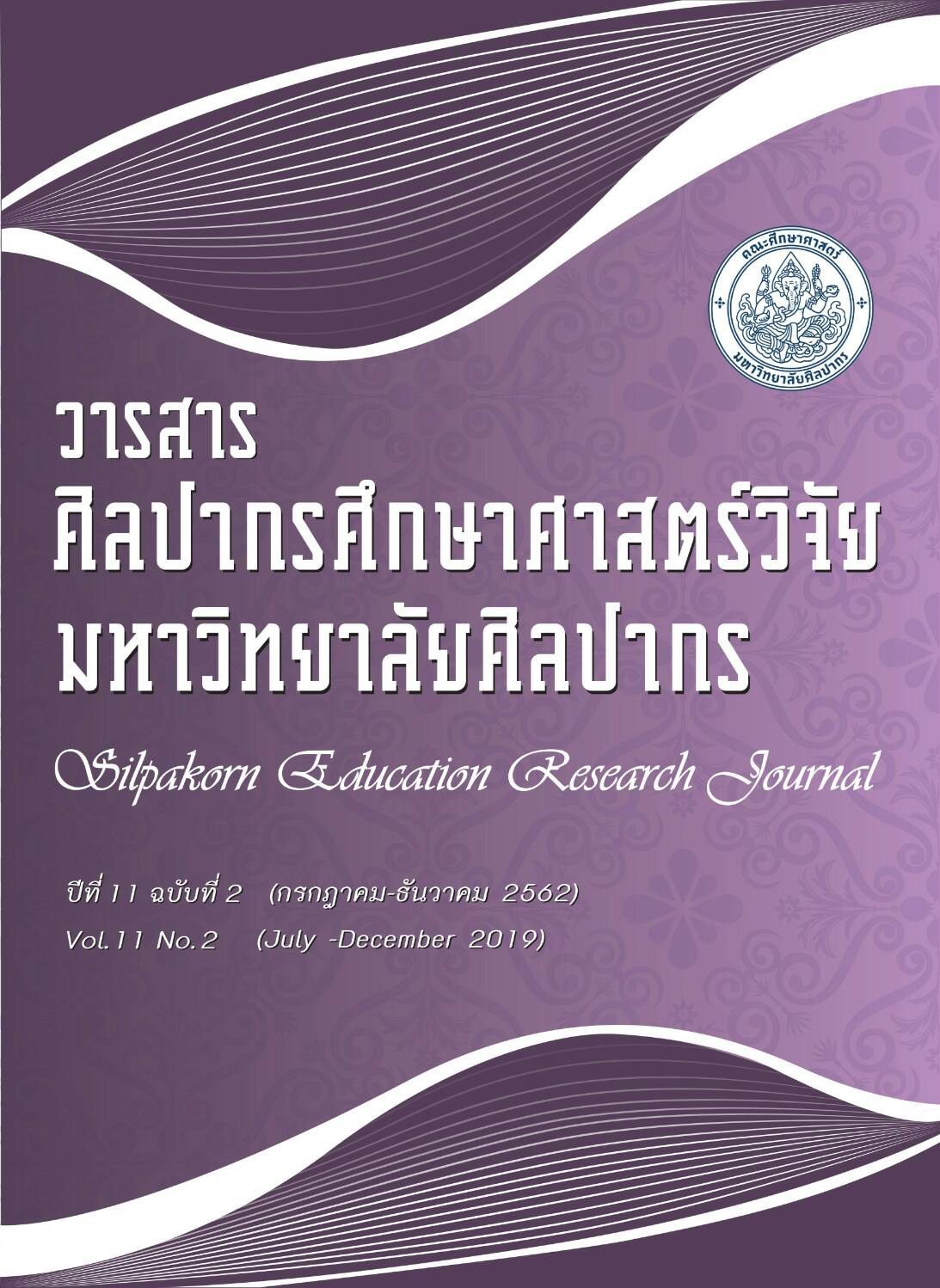การพัฒนารูปแบบการจัดการเรียนรู้พหุวัฒนธรรมด้วยวิธีการเชิงชาติพันธุ์วรรณนา เพื่อเสริมสร้างสมรรถนะข้ามวัฒนธรรม (Development of Instructional Model on Multiculturalism using Ethnographic Approach to Promote Cross – Cultural Competencies)
คำสำคัญ:
รูปแบบการจัดการเรียนรู้/ พหุวัฒนธรรมศึกษา/ วิธีการเชิงชาติพันธุ์วรรณนา/ สมรรถนะข้ามวัฒนธรรมบทคัดย่อ
การวิจัยนี้มีวัตถุประสงค์เพื่อ 1) พัฒนารูปแบบการจัดการเรียนรู้พหุวัฒนธรรมด้วยวิธีการเชิงชาติพันธุ์วรรณนาที่เสริมสร้างสมรรถนะข้ามวัฒนธรรม และ 2) ศึกษาประสิทธิผลของรูปแบบการจัดการเรียนรู้พหุวัฒนธรรมด้วยวิธีการเชิงชาติพันธุ์วรรณนาที่เสริมสร้างสมรรถนะข้ามวัฒนธรรม ผลการวิจัย พบว่า
- รูปแบบการจัดการเรียนรู้พหุวัฒนธรรมด้วยวิธีการเชิงชาติพันธุ์วรรณนาเพื่อเสริมสร้างสมรรถนะข้ามวัฒนธรรม ชื่อว่า รูปแบบการจัดการเรียนรู้เชิงชาติพันธุ์วรรณนา มี 4 องค์ประกอบ คือ 1) หลักการ 2) วัตถุประสงค์ 3) กระบวนการจัดการเรียนรู้ 7 ขั้นตอน ประกอบด้วย ขั้นเรียนรู้วิธีการเชิงชาติพันธุ์วรรณนา ขั้นเลือกสรรชุมชนชาติพันธุ์ต่างวัฒนธรรม ขั้นสร้างความสัมพันธ์กับชุมชน ขั้นแลกเปลี่ยนเรียนรู้ข้ามวัฒนธรรม ขั้นจัดกระทำและประมวลผลการเรียนรู้ ขั้นนำเสนอผลการเรียนรู้ข้ามวัฒนธรรม และขั้นสะท้อนย้อนคิดข้ามวัฒนธรรม และ 4) องค์ประกอบเงื่อนไขการนำรูปแบบการจัดการเรียนรู้ไปใช้
2. ประสิทธิผลของรูปแบบการจัดการเรียนรู้ฯ ประกอบด้วย 1) สมรรถนะข้ามวัฒนธรรมด้านความรู้ของนักศึกษาหลังเรียนสูงกว่าก่อนเรียนอย่างมีนัยสำคัญทางสถิติที่ระดับ .05 2) ผลการศึกษาพัฒนาการของสมรรถนะข้ามวัฒนธรรมด้านทักษะของนักศึกษามีระดับพฤติกรรมอยู่ในระดับน้อย ปานกลาง ปานกลาง และมากตามลำดับ และ 3) ผลการศึกษาสมรรถนะข้ามวัฒนธรรมด้านเจตคติของนักศึกษาอยู่ในระดับมาก
เอกสารอ้างอิง
Banks, J.A and Banks, C.A. McGee. (Eds.). (2007). Multicultural Education: Issues and perspectives. 6th ed. Hoboken, N.J.: Wiley.
Brauer, M. and Er-rafiy, A. (2011). “Increasing perceived variability reduces prejudice and discrimination.” Journal of Experimental Social Psychology, 47, 871-881.
Chantavanich, S. (2011). Qualitative Research Methodology. 19th ed. Bangkok: Chulalongkorn University, Published. (in Thai)
Chutsuriyawong, S. (2016). “The Paradigm of Community Based Learning for Enhancing Critical Thinking and Creative Problem Solving Abilities for Elementary School Students.” Silpakorn Educational Research Journal 8(1): 183-197. (in Thai)
Inrak, C. (2014). “Educational Management in Multicultural Society for Mountain Students of Primary School at Northern Marginal Area.” Silpakorn Educational Research Journal 6(1): 7-14. (in Thai)
Joyce, Bruce R., Marsha Weil, and Emily Calhoun. (2015). Model of Teaching. 9th ed. USA: Pearson Education, Inc.
Khemmani, T. (2013). Pedagogy: Knowledge for the effective instruction. Bangkok: Chulalongkorn University. (in Thai)
Kottak, C.P. (2009). Anthropology: The Exploration of Human Diversity. 13rd edition. USA: Mc Graw Hill.
Kunarak, K. (2015). Instructional Design. 5th ed. Nakhon Pathom: Silpakorn University. (in Thai)
Kruse, K. (2007). Introduction to Instructional Design and the ADDIE Model. Accessed 24 February 2016. Available from https://www.e-learningguru.com/articles/art2_1.htm
Nillapun, M. (2015). Education Research Methodology. 9th edition. Nakhon Pathom: Faculty of Education, Silpakorn University. (in Thai)
Ramsey, P.G. (1987). Teaching and learning in a diverse world. New York: Teacher’s College Press.
Siriphantana, C. (2016). “The Development of Community-Based Program on Thai the Folklore in Higher Education.” Silpakorn Educational Research Journal 8(1): 228-238. (in Thai)
Sterk-Elifson, C. (1993). “Outreach among drug users: Ethnography and health education.” Hum Organ 52: 162-168.





